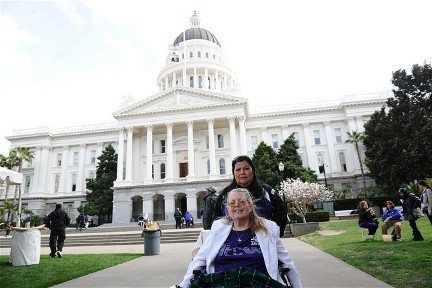Labor & Economy
Home-Care Workers to Sacramento: Let’s Get Healthy!

Over 400,000 elderly and disabled California residents depend on the In-Home Supportive Services (IHSS) program to keep them living safely and independently at home. Nearly half this number live in Los Angeles County. Over the last few weeks my colleagues have written articles that illustrate L.A. County caregivers’ need for a living wage and show the positive economic impact of that wage for all L.A. residents.
I am an in-home caregiver for my daughter Elizabeth, who suffers a mental disability. She is 21 years old, has autism and needs fulltime supervision. Any parent who has an autistic child understands the unique challenges we must deal with on a daily basis — such as my daughter needing to go to a special school, having to work with social workers who check in on her, juggling multiple doctors and administering her different medications throughout the day.
I am writing this article because I know my daughter deserves the very best care. Not only am I fighting for a living wage in L.A. County, but for vital changes to the IHSS program that would improve quality care and protect this lifeline service from future cuts.
That’s why, along with other union locals, mine is putting together a state-wide solution — a system that will stabilize long-term care for in-home care providers and create better health outcomes for elderly and disabled consumers. In fact, our changes to the current IHSS program will create a more efficient home care system, help reduce and manage chronic diseases, and provide stable funding to meet the rapid growth of California’s “silver-tsunami” of baby boomers, as well as disabled children and adults.
Together, we are fighting to ensure that California’s IHSS program is one that puts consumers first and raises standards by completing the circle of care – to one that includes doctors, social workers, specialists and in-home care providers. As a mother, this is the future I envision for my Elizabeth, but this movement isn’t about me or any single person—it’s about standing up for all the vulnerable residents in our families and in our communities. Stand with me and add your voice to this movement now as we take this conversation from our homes to Sacramento.
One way to ensure that seniors and people with disabilities are getting the highest level of care possible is to allow in-home caregivers to bridge the gap between specialists and general doctors who often don’t communicate with one another. With these program changes proposed by Let’s Get Healthy (a home-care union coalition), I would be able to take on that integral role of making sure my daughter’s health comes first.
We are also focused on making sure this essential program isn’t put on the chopping block for cuts year after year, causing an unstable workforce and the inability to grow to meet the needs of California’s population. Besides the fact that one in six children is diagnosed with a developmental disability, California has one of the highest populations of baby boomers. The reality is that, over the next 10 years, California will add more than 400,000 recipients to the IHSS program. We can’t let this program create an uncertain future for our loved ones and those who need help.
As a member of one of the nation’s largest health-care unions, SEIU United Long Term Care Workers (ULTCW), I am concerned for all caregivers in the country. What example are we setting in our state, which has the nation’s largest baby boomer population? For myself, facing cuts to hours and pay every year makes being a caregiver even more of a hardship. As a mother, I’ve only wanted the most promising future for my child. Elizabeth will never become independent, will never have a career or graduate from college, but she is still my daughter and I imagine a life for her where she receives the best treatment. That treatment starts with me.
By working together, we’ll be able to ensure that our parents, grandparents and those with disabilities will get the care they need to live safely and independently at home. This movement starts now. I’ve been to Sacramento recently to talk to elected officials about my concerns and now they need to hear from people from all over California, ordinary citizens who support quality long-term care. I urge you to add your voice to this movement. Go to www.ultcw.org/add-my-voice and sign the online petition, volunteer and add yourself to our alert list.
-

 State of InequalityApril 4, 2024
State of InequalityApril 4, 2024No, the New Minimum Wage Won’t Wreck the Fast Food Industry or the Economy
-

 State of InequalityApril 18, 2024
State of InequalityApril 18, 2024Critical Audit of California’s Efforts to Reduce Homelessness Has Silver Linings
-

 State of InequalityMarch 21, 2024
State of InequalityMarch 21, 2024Nurses Union Says State Watchdog Does Not Adequately Investigate Staffing Crisis
-

 Latest NewsApril 5, 2024
Latest NewsApril 5, 2024Economist Michael Reich on Why California Fast-Food Wages Can Rise Without Job Losses and Higher Prices
-

 California UncoveredApril 19, 2024
California UncoveredApril 19, 2024Los Angeles’ Black Churches Join National Effort to Support Dementia Patients and Their Families
-

 Latest NewsMarch 22, 2024
Latest NewsMarch 22, 2024In Georgia, a Basic Income Program’s Success With Black Women Adds to Growing National Interest
-

 Latest NewsApril 8, 2024
Latest NewsApril 8, 2024Report: Banks Should Set Stricter Climate Goals for Agriculture Clients
-

 Striking BackMarch 25, 2024
Striking BackMarch 25, 2024Unionizing Planned Parenthood




















